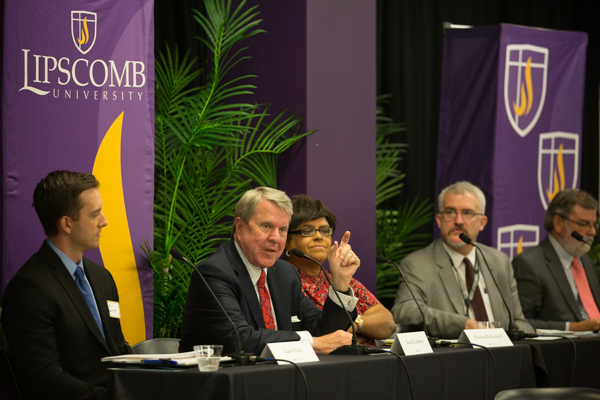Story by Katie Bianchini and Becca Risley
The Lipscomb Department of Communication and Journalism presented the second annual Morality and the Media conference held Friday in the Ezell building.
Speakers engaged students in a variety of controversial topics such as youth violence, transgender policy and civility in public discourse.
“Hearing from professionals in the field can prove to be invaluable,” junior Reese Lusk said. “Gaining wisdom from people that are currently doing what we want to do is an amazing opportunity.”
Chair of the Department of Communication and Journalism Alan Griggs said he hoped the day would allow students to gain insight into the world of communication through professionals.
“We really wanted to explore not only the issues, but how the media cover those issues from the viewpoint and perspective of working journalists and those who have been in journalism,” Griggs said. “There isn’t enough time given for a good, broad discussion of these topics from the perspective that we bring.”
One panel discussed the ongoing, national issue of transgender bathroom usage and equal access to secure public places.
A main focus of this panel was the concept of privacy for the transgender population and how journalists should navigate reporting on such sensitive matters.
“There is no documentation of transgender people going into the bathroom and harassing people,” said Dr. Marisa Richmond of the Tennessee Transgender Political Coalition. “But we have tons of documentation of transgender people going into bathrooms and being harassed.”
Another panelist, Zach Pruitt of the Family Action Council of Tennessee, argued that “the rights of some come at the expense of others,” saying that regardless of documentation, women should not be in the same room as biological men in this context.
“The transgender issue is something that a lot of people shy away from, but we wanted to tackle head on because we felt it was very important for our students to learn more about that,” Griggs said.
Keynote speaker Mike Reicher addressed students in the afternoon about quality journalism founded on statistical data.
“Data journalism provides precision; you just can’t argue with numbers,” he said. “It can help you discover key anecdotes and hold public officials accountable for their actions.”
Reicher said that as an investigative reporter, he relies heavily on data to help him bring hidden stories to the surface. He told students about a case where he used vehicle inventory and purchase records to uncover wasteful spending and use of water among Los Angeles governmental supervisors.
“One guy was getting his car washed two to three times per week amid the drought in L.A.,” he said. “It was fun being able to call him out and see the impact the story had on water consumption across all county departments.”
The second annual Morality and the Media conference completed with a panel about politeness in media conversations. Panelists agreed that to maintain civil discourse, reporters and public relations experts must listen to the public and respond with respect.
“Civil discourse is conversation that is intended to enhance understanding,” panel moderator Lydia Lenker said. “We can disagree with [each other] without being disagreeable.”
Several students in the department were present during the panel discussions on Friday. Those in attendence agreed that hosting the conference on campus brings merit and credibility to the academia of the department.
“Morality is subjective depending on who you talk to and what you talk about,” sophomore Sarah Karoline Joy Rodden said. “Having the opportunity to be in a room filled with people of different backgrounds and different ideas is vital to open up your own mind and your own world especially when it comes to reporting and journalism.”
Photo by Erin Turner

